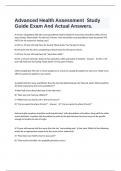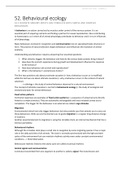Advanced Health Assessment Study
Guide Exam And Actual Answers.
A 59 year old patients tells the nurse practitioner that he thinks he must have ulcerative colitis. He has
been having "black stools" for the last 24 hours. How would the nurse practitioner best document THE
FACTS for his reason for seeking care?
A) JM is a 59 year old male here for having "black stools" for the past 24 hours.
B) JM came into the clinic complaining of black stools for the past 24 hours.
C) JM is a 59 year old male here for "ulcerative colitis."
D) JM, a 59 year old male, states he has ulcerative colitis and wants it checked. - Answer A) JM is a 59
year old male here for having "black stools" for the past 24 hours.
Chief Complaint(s) The one or more symptoms or concerns causing the patient to seek care. Make every
effort to quote the patient's own words.
A patient tells the nurse practitioner that she has had abdominal pain for the past week. What would be
the best response by the nurse practitioner?
A) We'll talk more about that later in the interview."
B) "Have you ever had any children?"
C) "What have you had to eat in the last 4 hours?"
D) "Can you point to where it hurts?" - Answer D) "Can you point to where it hurts?"
Each principle symptom should be well-characterized, with descriptions of location; along with the other
seven attributes. Location: Ask the patient to point to the pain because lay terms may not be specific
enough to localize the site of origin.
A 29-year-old woman tells the nurse that she has "excruciating pain" in her back. Which of the following
would be an appropriate response by the nurse to her statement?
A) "How does your family react to your pain?"
B) "That must be terrible. You probably pinched a nerve."
,C) "I've had back pain myself and it can be excruciating."
D) "How would you say the pain affects your ability to do your daily activities?" - Answer D) "How
would you say the pain affects your ability to do your daily activities?"
Inquire about the effects of pain on the patient's daily activities, mood, sleep, work, and sexual activity.
In recording the childhood illnesses of a patient who denies having had any, which of the following notes
by the nurse would be most accurate?
A) Patient denies usual childhood illnesses.
B) Patient states he was a "very healthy" child.
C) Patient states sister had measles, but he didn't.
D) Patient denies measles, mumps, rubella, chickenpox, pertussis, rheumatic fever, and polio. - Answer
D) Patient denies measles, mumps, rubella, chickenpox, pertussis, rheumatic fever, and polio.
Childhood illnesses include measles, rubella, mumps, whooping cough, rheumatic fever, scarlet fever,
and polio. They are included in the past history.
A patient tells the nurse that he is allergic to penicillin. What would be the nurse's best response to this
information?
A) "Are you allergic to any other drugs?"
B) "How often have you received penicillin?"
C) "I'll write your allergy on your chart so you won't receive any."
D) "Please describe what happens to you when you take penicillin." - Answer D) "Please describe what
happens to you when you take penicillin."
Allergies, including specific reactions to each medication, such as rash or nausea, must be recorded.
The nurse is taking a family history. Important diseases or problems to ask the patient about include:
A) emphysema.
B) head trauma.
C) mental illness.
,D) fractured bones. - Answer C) mental illness.
Specifically ask for any family history of heart disease, high blood pressure, stroke, diabetes, obesity,
blood disorders, ovarian cancer, colon cancer, sickle cell anemia, arthritis, allergies, alcohol or drug
addiction, mental illness, suicide, seizure disorder, kidney disease, and tuberculosis. The other answers
are acquired.
The following information is recorded in the health history: "Patient denies chest pain, palpitations,
orthopnea, and paroxysmal nocturnal dyspnea." Which category does it belong to?
A) Chief complaint
B) Present illness
C) Personal and social history
D) Review of systems - Answer D) Review of systems
Most review of systems questions pertain to systems. You may also draw on Review of Systems questions
related to the Chief Complaint to establish positives and negatives that help clarify the diagnosis.
Which of the following statements represents subjective data obtained from the patient regarding his
skin?
A) Skin appears dry.
B) No obvious lesions
C) Denies color change
D) Lesion noted lateral aspect right arm - Answer C) Denies color change
Remember that the history (from the chief complaint through review of systems) should be limited to
patient statements or subjective data—factors that the person says were or were not present.
Subjective data is what the patient tells you.
The following information is best placed in which category? "The patient had a stent placed in the left
anterior descending artery (LAD) in 1999."
A) Medical
B) Surgical
, C) Obstetrics/gynecology
D) Psychiatric - Answer B) Surgical
Provide information relative to Adult Illnesses in each of four areas: Medical, Surgical,
Obstetric/Gynecologic, and Psychiatric.
During the aging process, the hair can look gray or white and begin to feel thin and fine. The nurse
practitioner knows that this occurs because of a decrease in:
A) pigmentation
B) thyroid stimulating hormone
C) phagocytes
D) fungacytes - Answer A) pigmentation
Hair undergoes a series of changes. Scalp hair loses its pigment (functioning of melanocytes) so the hair
looks gray or white and feels thin and fine. The other options are not correct.
You are speaking to an 8th grade class about health prevention and are preparing to discuss the ABCDEs
of melanoma. Which of the following descriptions correctly defines the ABCDEs?
A) A = actinic; B = basal cell; C = color changes, especially blue; D = diameter >6 mm; E = evolution
B) A = asymmetry; B = irregular borders; C = color changes, especially blue; D = diameter >6 mm; E =
evolution
C) A = actinic; B = irregular borders; C = keratoses; D = dystrophic nails; E = evolution
D) A = asymmetry; B = regular borders; C = color changes, especially orange; D = diameter >6 mm; E =
evolution - Answer B) A = asymmetry; B = irregular borders; C = color changes, especially blue; D =
diameter >6 mm; E = evolution
You are examining the skin on a 22 year old female when you notice a circumscribed superficial lesion
that is elevated approximately 0.5cm in diameter, filled with serous fluid. What type of lesion is this?
A) macule
B) papule
C) vesicle
D) spider angioma - Answer C) vesicle





